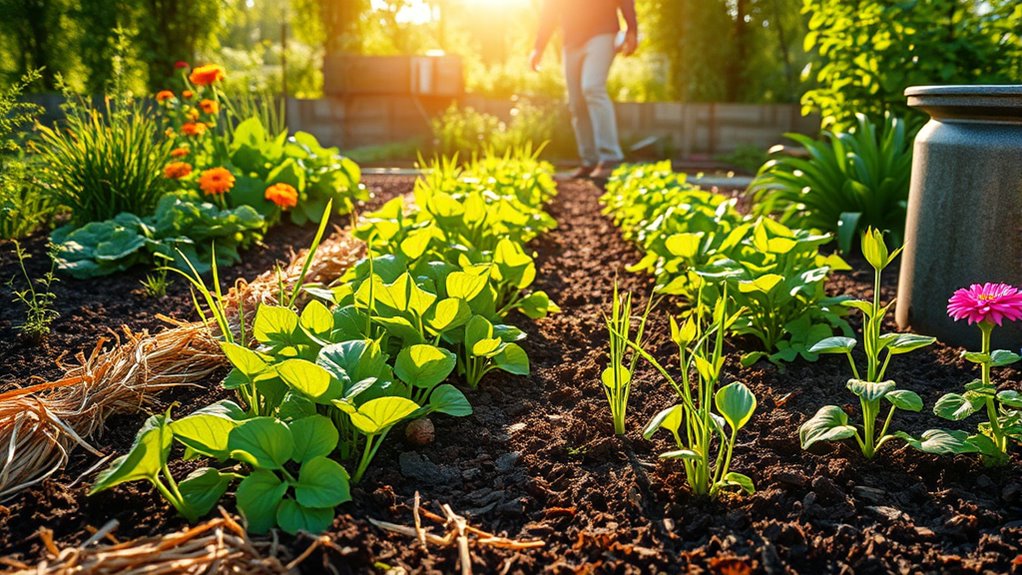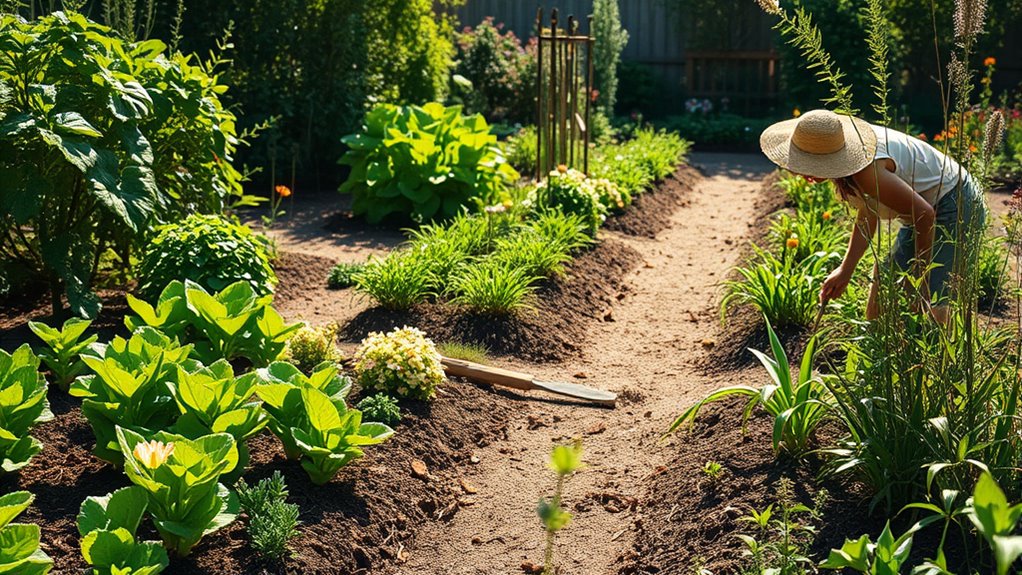To control weeds naturally in your organic garden, start by applying 2-3 inches of organic mulch like straw or compost around your plants. Incorporate cover crops such as clover or rye to shade the soil and reduce weed germination. Combining these methods creates a sustainable system that improves soil health and minimizes weeds over time. Using tools like AI for monitoring can further enhance your weed management skills—continue exploring for more effective strategies.
Key Takeaways
- Apply 2-3 inches of organic mulch around plants to block weed seeds and retain soil moisture.
- Use cover crops like clover or rye to shade the ground and outcompete weeds naturally.
- Combine mulching and cover cropping for a sustainable, integrated weed management system.
- Utilize AI tools for weed detection and monitoring to improve natural weed control efficiency.
- Promote soil health and biodiversity through organic methods, reducing weed growth and supporting healthy plants.

Controlling weeds naturally offers an eco-friendly alternative to chemical herbicides and can be highly effective when you choose the right strategies. One of the most practical methods is to apply mulching techniques. By applying a thick layer of organic mulch—such as straw, wood chips, or compost—you create a physical barrier that blocks sunlight from reaching weed seeds, preventing them from germinating. Mulching also helps retain soil moisture, suppresses weeds over time, and improves soil health as the organic material decomposes. The key is to lay down at least 2 to 3 inches of mulch around your plants, ensuring it remains dry and undisturbed to maximize its weed-suppressing power. Regularly replenishing mulch keeps the barrier effective and prevents weeds from pushing through.
Alongside mulching, incorporating cover crop benefits into your weed management plan can make a significant difference. Cover crops like clover, vetch, or rye serve multiple functions: they outcompete weeds for nutrients and space, reduce soil erosion, and improve soil fertility. When you plant cover crops during off-season periods, they form a dense canopy that shades the ground, making it difficult for weed seeds to sprout and establish. After the cover crop matures, you can cut it down and incorporate it into the soil as green manure, further enriching your garden’s nutrients and creating a less hospitable environment for weeds. This practice not only minimizes weed growth but also promotes a healthy, thriving garden ecosystem.
Both mulching techniques and cover crop benefits work together to create a natural weed control system that’s sustainable and safe for your garden. Mulch acts as an immediate weed barrier, while cover crops provide long-term suppression by competing with weeds and enhancing soil health. When combined, these strategies reduce your reliance on chemical herbicides and foster a balanced garden environment. Incorporating AI-driven monitoring and analysis can further enhance weed detection and improve overall management efficiency. You’ll find that consistent application and maintenance of these methods are key to keeping weeds at bay. Over time, you’ll notice fewer weeds, healthier plants, and a more resilient garden. These eco-friendly approaches also support beneficial insects, improve soil structure, and promote biodiversity, making your garden not only weed-free but also more sustainable overall. By understanding and applying these natural methods, you take an active role in nurturing a vibrant, chemical-free garden that benefits both the environment and your plants.
Frequently Asked Questions
Can Natural Weed Control Methods Harm Beneficial Insects?
Natural weed control methods generally pose less risk to beneficial insect safety compared to chemical options. Since these strategies often use physical removal or organic mulches, they minimize chemical residue concerns that could harm pollinators and other beneficial insects. You can confidently apply natural methods, knowing you’re reducing weed problems without disturbing your garden’s ecosystem or risking harm to helpful insects, making your garden healthier and more balanced.
Are Organic Weed Control Strategies Effective on Stubborn Weeds?
Did you know that organic weed control can be over 80% effective on stubborn weeds? You can try using compost tea, which boosts soil health and weakens weeds, or cover cropping to shade out persistent weeds. These strategies take time but are safe for your garden. With patience and consistency, you’ll notice fewer weeds, and your garden stays healthy without synthetic chemicals.
How Often Should Natural Weed Control Techniques Be Applied?
You should apply natural weed control techniques regularly, typically every 1-2 weeks, to guarantee effective weed removal. Consistent application frequency helps prevent weeds from establishing deep roots and spreading. Keep an eye on your garden and adapt your weed control schedule as needed, especially after heavy rain or growth spurts. Regular monitoring and timely application ensure your organic garden stays weed-free without relying on harsh chemicals.
Can Mulching Alone Prevent All Weed Growth?
Mulching alone isn’t foolproof for weed prevention, but it substantially boosts mulch effectiveness in weed suppression. It limits light exposure, making it harder for weeds to sprout. However, some persistent weeds might still emerge through gaps or in areas where the mulch isn’t thick enough. To maximize weed control, combine mulching with regular removal of emerging weeds and proper garden maintenance. This integrated approach keeps your garden healthier and weed-free.
What Are the Long-Term Impacts of Natural Weed Control?
You wonder about the long-term impacts of natural weed control. By using organic methods, you help maintain soil health, ensuring nutrients stay balanced and soil structure improves over time. Additionally, these strategies positively impact biodiversity, supporting beneficial insects and soil microbes. Unlike chemical controls, natural methods foster a resilient garden ecosystem, leading to sustainable weed management that benefits your garden’s overall health and sustainability in the long run.
Conclusion
By adopting natural weed control strategies, you can maintain a healthy, organic garden without harmful chemicals. Did you know that using mulches and manual removal can reduce weed growth by up to 90%? That’s like cutting your weed problems in half! Stay consistent with these eco-friendly methods, and you’ll enjoy a thriving garden that’s safe for both you and the environment. Embrace nature’s solutions, and your garden will flourish naturally.










